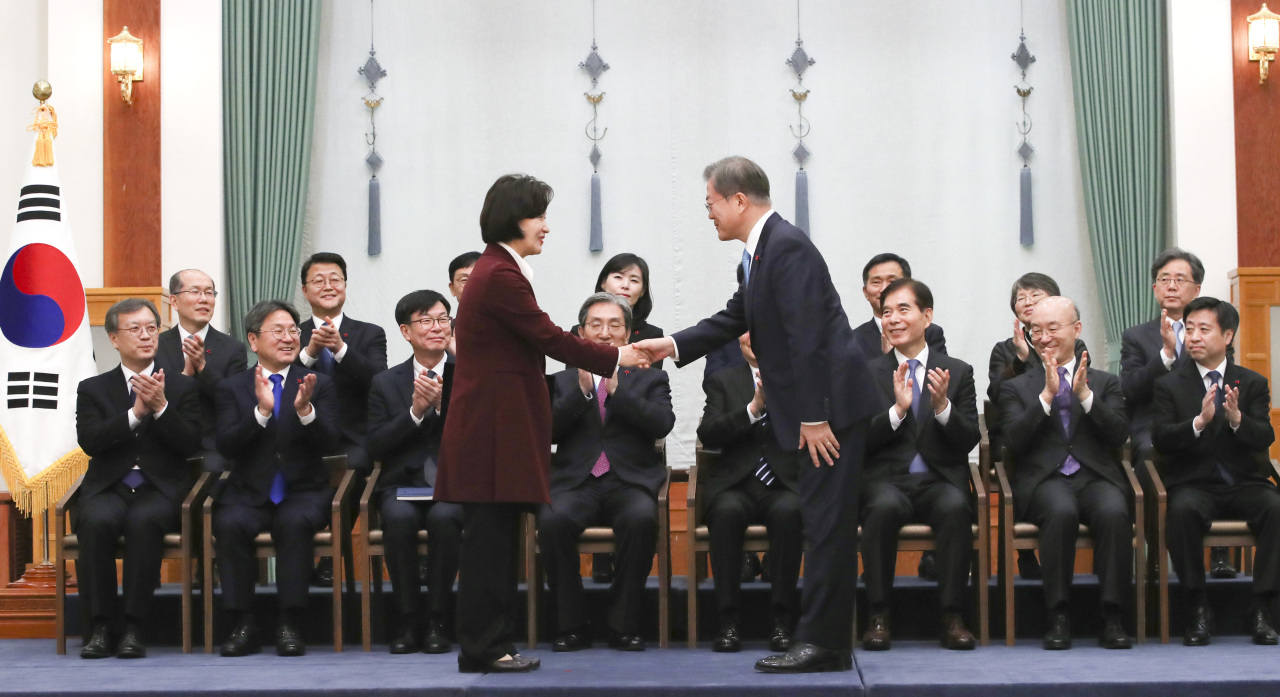President Moon Jae-in’s drive for prosecution reform is expected to gain traction with his appointment of the new justice minister and the passage of a bill designed to ease power concentrated in the state prosecution.
Buoyed by these major steps that will help his key election pledge for reformation to materialize, Moon vowed to make “clear change” this year, saying revamping powerful institutions and pursuing a fair society are the beginning of the process.
“No powerful institution can exist above the people,” he said during an event at the Korea Chamber of Commerce and Industry headquarters in Seoul on Thursday.
 |
New Justice Minister Choo Mi-ae shakes hands with President Moon Jae-in after receiving the letter of appointment at Cheong Wa Dae in Seoul on Thursday. (Yonhap) |
The position of justice minster -- vacant for over two months after former minister Cho Kuk resigned following an investigation into corruption allegations -- was filled by Choo Mi-ae, a five-term lawmaker who led the ruling Democratic Party.
Moon’s appointment of Choo came immediately after the National Assembly’s confirmation hearing last week, despite the main opposition Liberty Korea Party’s refusal to adopt a formal hearing report.
“I hope (Choo) will lead the prosecution reform well as prescribed by law, which defines the minister as the final supervisor of the prosecution’s operations,” Moon told Choo at Cheong Wa Dae after he granted a letter of appointment to her.
In response, Choo said, “I will do my best to reform (the law enforcement system). We may never have an opportunity like this.”
Choo is expected to conduct a massive personnel reshuffle at the prosecution as early as next week.
Her next moves and how they will affect the prosecution’s investigations targeting officials involving Cheong Wa Dae are gaining attention.
Moon had hoped for former Minister Cho Kuk to spearhead the prosecution reform. However, such hopes were thwarted, as the prosecution had launched a probe into a scandal involving then-nominee Cho’s family investments and his children’s university admissions. On Tuesday, Cho was indicted on bribery charge, among others.
The prosecution and Cheong Wa Dae have been clashing over the probe, with the former criticizing presidential officials for intervening in the case and ruling party lawmakers firing back at the prosecution for trying to affect Cho’s confirmation hearing.
Investigations are also underway into allegations that the presidential office meddled with last year’s mayoral election in the city of Ulsan and that it blocked a 2017 internal inspection of Yoo Jae-soo, then-director general at the Financial Services Commission, over suspicions of graft.
It remains to be seen whether the upcoming reshuffle and Choo’s other actions will cause the probes to fizzle out or intensify tensions.
Another powerful tailwind for the Moon government and the ruling party is a prosecutorial reform bill passed last week. The bill calls for the creation of an investigation organization to check the power of the prosecution in probes of suspected corruption by all top-ranking government officials.
The Democratic Party plans to introduce a bill to grant more investigative power and authority to police next week.
“When the bill empowering police gets legislated, I will swiftly complete follow-up measures so that reform bills can effectively implemented,” Choo said during her confirmation hearing last week.
By Park Han-na (
hnpark@heraldcorp.com)








![[Today’s K-pop] Blackpink’s Jennie, Lisa invited to Coachella as solo acts](http://res.heraldm.com/phpwas/restmb_idxmake.php?idx=644&simg=/content/image/2024/11/21/20241121050099_0.jpg)